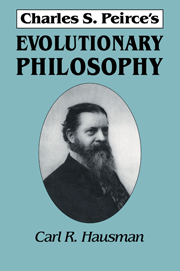5 - EVOLUTIONARY REALISM AND THE LINGUISTIC TURN
Published online by Cambridge University Press: 07 January 2010
Summary
The conception of Peirce's envisaged architectonic can be projected beyond the context of the late nineteenth and early twentieth centuries. The projection with which I am concerned springs from two architectonic conceptions dealt with in the earlier chapters: semeiotic and evolutionary realism. These conceptions may be applied to current interconnected controversies over the possibility of deciding between metaphysical antirealism and realism and between relativism and antirelativism in interpretation theory, which for Peirce falls under the domain of semeiotic.
Our main responsibility will be to see how Peirce's philosophical outlook avoids some of the consequences of recent attacks on the possibility of affirming realism. These considerations, in turn, have a bearing on the question of whether interpretation (in art criticism as well as in theoretical investigation) has a grounding outside texts and theories.
In the following remarks I shall respond from a Peircean perspective to the challenge that metaphysical assumptions about reality or extralinguistic objects and systematic speculation about all actual and possible experience are nonsensical, futile, or at least outdated. Philosophies that have dominated Western thought until the early twentieth century – and, indeed, have persisted in some circles in this century – presuppose a metaphysical or epistemological realism or an objective idealism (whether they are set forth in terms of these labels or appear as integral to rationalisms, empiricisms, and philosophies that suppose that there are noumenal or extraexperiential conditions of thought). These views share the assumption that there is something sufficiently objective to serve as a foundation that warrants rational argument and possible conclusions about which single perspective on experience or the world is more intelligible than another.
- Type
- Chapter
- Information
- Charles S. Peirce's Evolutionary Philosophy , pp. 194 - 226Publisher: Cambridge University PressPrint publication year: 1993



